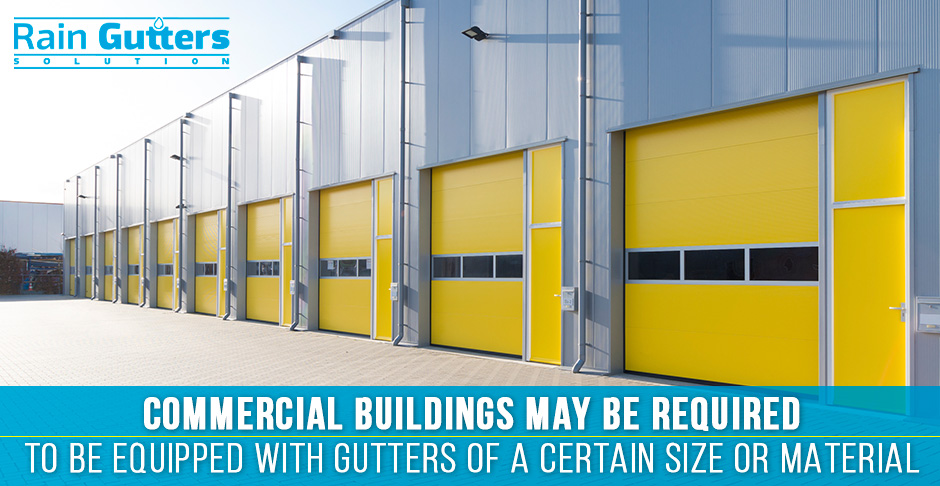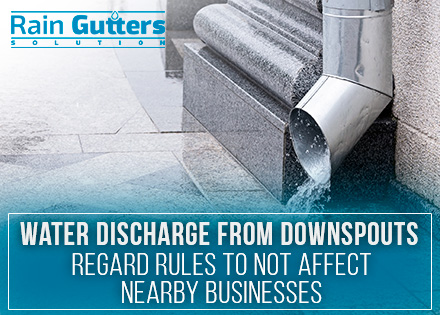What Are the Main Differences between Commercial Rain Gutters and Residential Rain Gutters?
March 30, 2021

Before we delve into what sets apart
commercial rain gutters from residential ones, let's set the record straight: unless you live in the aridest part of the world, your property will always benefit from having rain gutters. It doesn't matter if you own a two-story English Tudor in an idyllic suburb, a run-of-the-mill duplex near the city center, or a retail building in the middle of the fashion district—you will need protection from the rain. If you live in Miami-Dade, gutters are a must, as our rainy seasons are notoriously heavy.
Rain can cause serious damage. Rainwater cascading from your roof will eventually cause lawn and garden erosion, soak and debilitate your foundations, flood your basement, and cause all sorts of structural damages that will weaken your property's durability and shrink its value. This is particularly something to consider for commercial property, as your investment could be compromised.
Homeowners are aware of these consequences and know the importance of having proper rain gutters installed. They know paying for a system that can redistribute rainwater to places where it won't damage their foundations is worth every penny and saves them the trouble of having to do expensive repairs later on.
A lot of business owners are becoming savvy on this issue and are making sure to equip their retail shops, office buildings, and industrial warehouses with cost-effective solutions that keep their properties protected from the rain. Rain gutters can also add to the aesthetic exterior of a building, which is a plus for retailers and office owners.
However, what still puzzles many commercial property owners are the differences between rain gutters for their buildings compared to rain gutters for homes. There are a few things they should factor in before having them installed for your commercial property.
Building Code Requirements

In most states and municipalities, buildings are required to adhere to a specific set of rules of construction and planning, and these rules tend to be more stringent for commercial properties. These rules sometimes apply to rain gutter installations affecting the type of material, the capacity, and the design, as well as where downspouts should discharge water.
Make sure to check all the building regulation details with an experienced licensed contractor who can give you advice on how to get the best out of your rain gutter installation.
Gutter Materials
Most people know that big commercial properties have different gutter needs and requirements versus smaller residential properties. Sturdiness tends to be one of the first.
While many homeowners are content with vinyl rain gutters—the cheapest alternative on the market— this kind of material could prove to be too feeble for what a commercial property needs.
Professional contractors know that
the best options for commercial rain gutters come in aluminum and galvanized and stainless steel varieties. These three options are impervious to rust, and steel gutters are also quite resistant to denting. Their enhanced durability is also a major selling point considering they only need to be replaced every 30 plus years, which is extremely alluring for commercial property owners.
Gutter Capacity
A large property with an even larger roof is usually exposed to more rain than average, which is why the usual 5-inch gutter used on most homes won't work when a downpour hits. To be able to divert more generous quantities of water away from a commercial property, licensed contractors usually choose 6-inch gutters.
But capacity is not only limited to inches. While round-shaped gutters may look attractive on a home, they can't hold as much as K-style or box style gutters, which comprise the most popular gutter types for commercial rain gutters.
The benefits of having rain gutters installed for your business include boosting your property's value, improving the exterior appearance of your building, keeping the surrounding area dry and ready for customers, and lower your property's maintenance costs during the rainy season. There is no reason to forgo installing rain gutters if you care about your business, customers, and money.
If you are ready to get commercial rain gutters and are looking for a highly-regarded company in the Miami-Dade County, look no further than Rain Gutters Solution. We have over 20 years of experience helping both home and commercial property owners gear up against Miami's intense rainy seasons. Call
(305) 270-7779 or fill out our
contact form to get in contact with our team. Also, consider subscribing to our
newsletter to get valuable information on your email.
If you found this article helpful then let us know in the comments section below. Likewise, feel free to share it using the share options below. Want us to cover another topic of your interest pertaining to rain gutters? If so, then like us and follow us on social media, and post to any of our social media profiles the topic you'd like us to discuss:
Facebook @RainGuttersSolution,
Twitter @Gutterssolution and
Instagram @RainGuttersSolution

 In most states and municipalities, buildings are required to adhere to a specific set of rules of construction and planning, and these rules tend to be more stringent for commercial properties. These rules sometimes apply to rain gutter installations affecting the type of material, the capacity, and the design, as well as where downspouts should discharge water.
In most states and municipalities, buildings are required to adhere to a specific set of rules of construction and planning, and these rules tend to be more stringent for commercial properties. These rules sometimes apply to rain gutter installations affecting the type of material, the capacity, and the design, as well as where downspouts should discharge water.